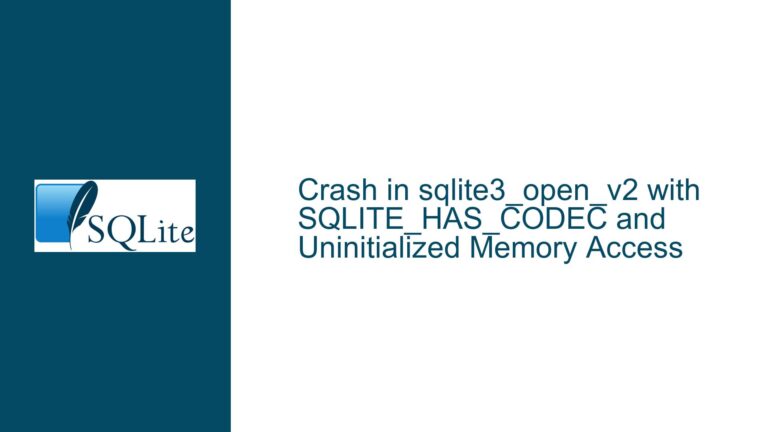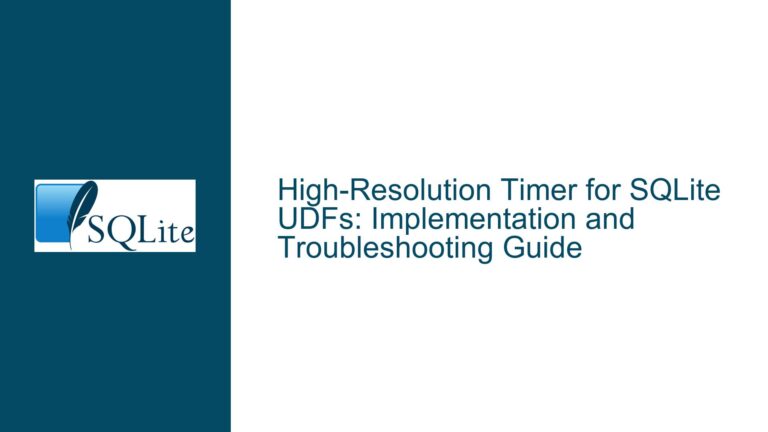Building and Including sqlite3_rsync on OpenBSD: A Comprehensive Guide
Understanding the sqlite3_rsync Tool and OpenBSD Compatibility
The sqlite3_rsync tool is a utility designed to synchronize SQLite databases efficiently, leveraging the rsync algorithm to minimize data transfer. This tool is particularly useful in scenarios where databases need to be synchronized across different systems or environments with minimal bandwidth usage. However, integrating sqlite3_rsync into OpenBSD, a security-focused operating system, presents unique challenges due to differences in build systems, dependencies, and the way OpenBSD handles ports and packages.
OpenBSD’s ports system is a collection of software packages that are adapted to run on the OpenBSD operating system. The system is designed to ensure that software is built and installed in a consistent and secure manner. However, this also means that integrating new tools, such as sqlite3_rsync, requires a deep understanding of both the tool’s build process and the OpenBSD ports system. The discussion highlights the need to adapt the sqlite3_rsync build process to fit within the constraints and conventions of OpenBSD’s ports system, particularly in light of the upcoming deprecation of the SQLite amalgamation tarball.
Deprecation of the SQLite Amalgamation Tarball and Its Implications
The SQLite amalgamation tarball has historically been a convenient way to distribute the SQLite source code as a single, pre-configured file. This approach simplified the build process by eliminating the need for additional dependencies, such as TCL, which were previously required by the canonical Makefile. However, with the evolution of SQLite’s build system, the need for the amalgamation tarball has diminished. The SQLite team has announced plans to deprecate the amalgamation tarball, which will impact how SQLite and its associated tools, including sqlite3_rsync, are built and distributed.
For OpenBSD, this deprecation means that the current method of building SQLite from the ports system will need to be updated. The OpenBSD ports system currently relies on the amalgamation tarball to compile SQLite, and the deprecation will require a shift to building from the tip-of-trunk or another supported source. This transition is not trivial, as it involves ensuring that the new build process is compatible with OpenBSD’s security and build requirements. Additionally, the inclusion of sqlite3_rsync and other tools in the OpenBSD ports system will need to be addressed, as these tools are not currently part of the standard SQLite distribution.
Building sqlite3_rsync on OpenBSD: A Step-by-Step Guide
To successfully build and integrate sqlite3_rsync on OpenBSD, it is essential to follow a structured approach that addresses both the technical and procedural aspects of the process. The following steps outline the necessary actions to achieve this goal:
Downloading the Source Code: The first step is to obtain the SQLite source code from the official repository. As the amalgamation tarball is being deprecated, it is recommended to use the tip-of-trunk source code, which can be downloaded as a tarball from the SQLite website. This source code includes the latest changes and improvements, ensuring compatibility with the new build system.
Configuring the Build Environment: Once the source code is downloaded, the next step is to configure the build environment. This involves running the
./configurescript, which sets up the necessary build parameters and checks for any missing dependencies. On OpenBSD, it is crucial to ensure that the system has the required tools, such as gcc or clang, and make installed. The./configurescript should be executed in the root directory of the extracted source code.Building sqlite3_rsync: After configuring the build environment, the next step is to compile the sqlite3_rsync tool. This is done by running the
make sqlite3_rsynccommand, which triggers the build process for the specific tool. It is important to monitor the build output for any errors or warnings, as these may indicate issues with the build environment or missing dependencies. If the build is successful, the sqlite3_rsync executable will be generated in the specified output directory.Testing the Build: Once the sqlite3_rsync tool is built, it is essential to test its functionality to ensure that it works as expected. This involves running the tool with a sample SQLite database and verifying that it can synchronize the database correctly. Testing should be done in a controlled environment to avoid any potential data loss or corruption. If any issues are encountered during testing, it may be necessary to revisit the build process and address any underlying problems.
Integrating into the OpenBSD Ports System: The final step is to integrate sqlite3_rsync into the OpenBSD ports system. This involves creating or modifying the port Makefile to include the necessary build instructions for sqlite3_rsync. The Makefile should specify the source code location, build commands, and any additional dependencies required for the tool. Once the Makefile is configured, the port can be built and installed using the standard OpenBSD ports commands. It is important to test the port installation to ensure that sqlite3_rsync is correctly integrated into the system and can be accessed by users.
Addressing Potential Issues and Ensuring Compatibility
While the above steps provide a general guide for building and integrating sqlite3_rsync on OpenBSD, there are several potential issues that may arise during the process. These issues can range from missing dependencies to compatibility problems with the OpenBSD build system. To address these challenges, it is important to take a proactive approach and implement the following strategies:
Dependency Management: One of the most common issues when building software on OpenBSD is managing dependencies. The sqlite3_rsync tool may require additional libraries or tools that are not included in the standard OpenBSD installation. To address this, it is essential to identify and install any missing dependencies before starting the build process. This can be done using the OpenBSD package manager, which provides a convenient way to install and manage software packages.
Build System Compatibility: The SQLite build system has evolved over time, and the deprecation of the amalgamation tarball is a significant change that may impact compatibility with the OpenBSD ports system. To ensure compatibility, it is important to stay informed about the latest developments in the SQLite build process and adapt the OpenBSD port accordingly. This may involve modifying the port Makefile or updating the build instructions to align with the new build system.
Security Considerations: OpenBSD is known for its strong focus on security, and this extends to the ports system. When integrating sqlite3_rsync into the OpenBSD ports system, it is important to consider the security implications of the tool and ensure that it adheres to OpenBSD’s security standards. This may involve reviewing the source code for potential vulnerabilities, implementing security best practices during the build process, and testing the tool in a secure environment.
Collaboration with the SQLite Team: Given the upcoming deprecation of the amalgamation tarball, it is important to maintain open communication with the SQLite team to ensure a smooth transition. This may involve participating in discussions, providing feedback on the new build process, and collaborating on testing and integration efforts. By working closely with the SQLite team, it is possible to address any issues that arise and ensure that sqlite3_rsync remains compatible with OpenBSD.
Conclusion
Building and integrating sqlite3_rsync on OpenBSD requires a thorough understanding of both the tool’s build process and the OpenBSD ports system. The deprecation of the SQLite amalgamation tarball adds an additional layer of complexity, necessitating a shift to building from the tip-of-trunk source code. By following the steps outlined in this guide and addressing potential issues proactively, it is possible to successfully integrate sqlite3_rsync into the OpenBSD ports system and ensure its continued compatibility with the operating system. Collaboration with the SQLite team and adherence to OpenBSD’s security standards are key to achieving a seamless integration and maintaining the tool’s functionality in a secure and efficient manner.






